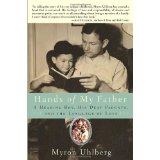 aThis book is a must-read, written by a man whose formative years during the Great Depression were made unique by the fact that he was a hearing child raised by two deaf parents. Hands of My Father is both a poignant memoir, a loving testament to his courageous parents, and a fascinating glimpse into growing up during those politically and economically tumultuous times.
aThis book is a must-read, written by a man whose formative years during the Great Depression were made unique by the fact that he was a hearing child raised by two deaf parents. Hands of My Father is both a poignant memoir, a loving testament to his courageous parents, and a fascinating glimpse into growing up during those politically and economically tumultuous times.
Louis and Silvia Uhlberg were each the children of large immigrant families in Brooklyn who had neither the time nor the skills to deal with the fact that one of their brood was deaf from illness at a very early age. No one in their families learned sign language and therefore had no way to communicate anything to their silent children. At some point, both were sent to deaf school where they were given a language and the knowledge that they were not alone, but it was neither a warm nor fuzzy experience. Their marriage, in the depths of the Great Depression, went against all odds, as did their decision to raise children. Their first child, the author, learned ASL—American Sign Language—as his first language, and English after that. At an exceptionally early age, Myron had to become his parents’ translator and interpreter to the outside hearing world with all the challenges–and resentment–that implies.
Through anecdotes both painful and sometimes hysterically funny, the author takes us inside his unique childhood world. We experience the slurs and disgust with which his family was treated by intolerant neighbors and strangers alike, but we also experience his nightly “entertainment” by his father through vivid and detailed stories, sometimes taken from newspaper headlines and sometimes from his own imagination, all told through a visual/gestural language as complex and beautiful as any spoken language. We learn that his father got a job when many during the Depression were unemployed, because the printing presses at the NY Daily News were so loud that deaf employees were preferred.
The many instances of love expressed by his parents, who were fearful that his isolation in a silent house would stunt him, ranged from his father’s hilarious attempts to find the restless Myron a hobby that would stick, to the constant physical embraces that were a natural extension of the Uhlbergs’ world, to his father’s adoption of the hated role of clown during large family gatherings as a way of bridging the hearing/deaf divide that was so painful to his wife and children. Although the Uhlberg’s younger son was also born a hearing child, he suffered childhood epilepsy which required Myron to take on the custodianship of his sibling as well as his parents.
Despite the difficulties faced every day by the Uhlbergs, they embraced their lives with a vital optimism that makes their story utterly compelling. But beyond that, Hands of My Father introduces the rest of us to a world and a culture hidden in plain view, with its own language, its own identity, its own special challenges, a world we are all challenged to not only accept, but to know and appreciate as part of the human experience.
